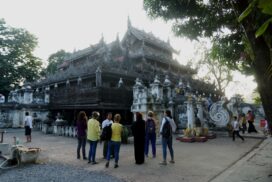Wetlands serve as crucial habitats for diverse wildlife, particularly migratory birds seeking refuge during hibernation. Encompassing a broad spectrum of both freshwater and seawater sources, wetlands include lakes, rivers, underground aquifers, swamps, marshes, tidal flats, mangroves, coastal areas, coral reefs, and man-made sites like fish farms, reservoirs, and dams, which are attractive to local and foreign travellers.
Myanmar needs to collaborate with the international community to develop and expand wetlands as vital habitats for various living beings. By fostering a collective commitment to wetland conservation, societies can ensure the long-term coexistence of humans and nature, promoting sustainable development for current and future generations.
Myanmar possesses three Ramsar sites across the nation: Moeyungyi Wetlands Wildlife Sanctuary, Indawgyi Wildlife Sanctuary, and Mainmahlakyun Wildlife Sanctuary. Additionally, a portion of the Gulf of Mottama earned the designation as Myanmar’s fourth Ramsar site in May 2017. These sites play a crucial role in preserving the natural environment, sustaining agriculture, and supporting rural livelihoods.
In line with the theme for 2024 World Wetlands Day: Wetlands and human well-being, everybody needs to live in a society in harmony with the natural environment, including wildlife and wetlands, to adjust to the impacts of climate change. To break this cycle of wetland loss and its detrimental effects on livelihoods and poverty, it is essential to shift the mindset towards recognizing wetlands as life-giving sources of jobs, incomes, and vital ecosystem services.
Myanmar is blessed with wetlands to create livelihoods for local people for fishery and cultivation as well as hibernation for migratory birds. While wetlands cover only approximately six per cent of the Earth’s land surface, they host 40 per cent of all plant and animal species, making them vital for biodiversity. Over a billion people worldwide depend on wetlands for their livelihoods, highlighting the critical connection between these ecosystems and human well-being.
To address this challenge, authorities and parents in society must prioritize educating future generations about wetland conservation. Myanmar people can foster a sense of responsibility towards these ecosystems and apply such nature to the motherland. Conserving wetlands becomes not only an act of protecting the environment but also a means of safeguarding the well-being of individuals and communities.
Myanmar needs to collaborate with the international community to develop and expand wetlands as vital habitats for various living beings. By fostering a collective commitment to wetland conservation, societies can ensure the long-term coexistence of humans and nature, promoting sustainable development for current and future generations.
Not only the existence of the natural environment but also the attractions of travellers are assets of the land of Myanmar. Everybody is responsible for ensuring natural wetlands to mitigate climate change impacts and sustain residents’ livelihoods. If so, the society will be peaceful and prosper.














